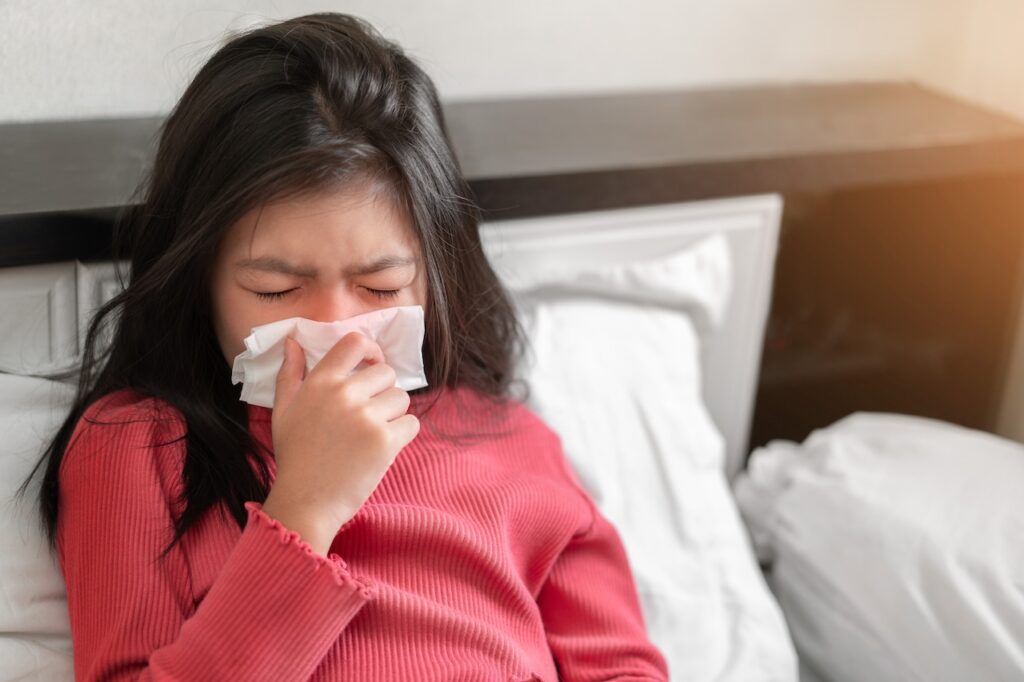It’s that time of year again, when Dr. Andy Anderson starts seeing more patients with a cough, congestion, and shortness of breath — telltale signs of the highly contagious respiratory illness RSV.
Emergency departments in New Jersey and around the United States are seeing a wide variety of respiratory illnesses, ranging from the common cold to COVID-19, flu, and RSV, according to the Centers for Disease Control and Prevention. RSV activity in particular is “moderate” nationally and continues to increase, particularly in young children.
“We tend to see this every year. Last year, RSV was the first virus we saw increasing in frequency,” said Anderson, executive vice president and chief medical and quality officer for RWJ Barnabas Health.
Respiratory Syncytial Virus, or RSV, is a common respiratory virus that causes mild, cold-like symptoms in most people, according to the CDC. However, it can cause severe illness in some people, especially babies, older adults and the immunocompromised. The virus is the leading cause of childhood illness and hospitalization in infants.
Data from the New Jersey Department of Health shows New Jersey is currently experiencing high RSV activity, with increases in percent positivity, emergency department visits with a RSV diagnosis, and hospital admissions.
The highly contagious virus currently accounts for .6% of all emergency department visits in the country and nearly 1% of all visits in New Jersey, according to CDC’s Respiratory Illness Data Channel.
The percentage of emergency department visits for RSV is “very high” in the following counties: Bergen, Cumberland, Essex, Hudson, Middlesex, Monmouth, Morris, Ocean, Passaic, Somerset, Sussex, and Union.
Emergency visits for RSV are “high” in Atlantic and Cape May counties. Levels are “moderate” in Burlington, Camden, Gloucester, Hunterdon, Mercer, Salem, and Warren counties.
Hospital admissions associated with RSV have also been climbing since early October, particularly among children 0-4 years of age, according to the state’s latest respiratory illness surveillance report.

The state is seeing a growing number of emergency visits with RSV that required hospital admission, especially in among ages 0-4.New Jersey Department of Health
“For any children’s hospital, winter is typically a busy respiratory season. That’s when hospitals have an influx of children that have COVID, RSV, flu or other illnesses,” said Dr. Harpreet Pall, chair of pediatrics at K. Hovnanian Children’s Hospital at Jersey Shore University Medical Center.
“With young children, the risk is that they develop a condition called bronchiolitis, and that is inflammation in the lung. This is a very significant driver of hospitalizations in young children,” said Pall, who is also a professor at Hackensack Meridian School of Medicine.
Two to three out of every 100 infants under 6 months are hospitalized with RSV every year, according to the CDC. While the vast majority of children sick with RSV incur mild symptoms, those born premature or with certain medical conditions could be more susceptible to serious illness.
“Some children need to be put on a ventilator due to worsening condition and unfortunately sometimes they don’t recover. It is still well known that that could be one outcome,” said Pall.
Anywhere between 100-300 children die from RSV each year, according to the CDC.
Despite the risks posed by viruses like RSV, vaccination rates for respiratory illnesses remain alarmingly low across all age groups. In New Jersey, only 45% of adults have received the updated flu shot, 21% have received the updated COVID vaccine and 25.2% of adults 75+ have received the RSV vaccine.
“There has been so much misinformation and politicization of vaccines. So, I take all that off the table and simply talk to patients about their risks and the benefits of vaccines,” said Dr. Suraj Kumar Saggar, chief of the department of infectious disease at Holy Name Medical Center in Teaneck.
People often assume vaccines are for personal protection, but Saggar emphasized that vaccines are a community health measure.
“It goes back to the idea of herd immunity. If it’s not you at risk, people you interact with may be at risk. So by you being protected, you protect the population at large,” said Saggar.
Just this week, RWJ Barnabas Health reinstated its pandemic-era mask policy amid the spike in respiratory infections.
On Monday, the health system announced that when visiting any of its 14 hospitals and facilities, visitors “are expected” to wear an appropriate mask. People are also asked to stay away if they’re sick or experiencing symptoms of the flu, COVID-19 or another respiratory illness, such as RSV.
“It’s to protect our patients and their families and to protect our own employees as well,” said Anderson. “We know COVID-19, RSV and such are spread through respiratory droplets, so it’s really a means of infection control to prevent spread. It’s not perfect, but it does help.”
People can get their COVID-19 shot, flu shot, and RSV vaccine at the same time. However, the RSV vaccine is only recommended for a small group of people:
- Pregnant people during weeks 32 to 36 of pregnancy starting on Sept. 1
- Babies entering their first RSV season or born during the RSV season
- People ages 60 to 74 with chronic heart or lung disease, certain other chronic medical conditions, and those who are residents of nursing homes or other long-term care facilities
- Everyone ages 75 and older
Our journalism needs your support. Please subscribe today to NJ.com.
Jackie Roman may be reached at jroman@njadvancemedia.com.

